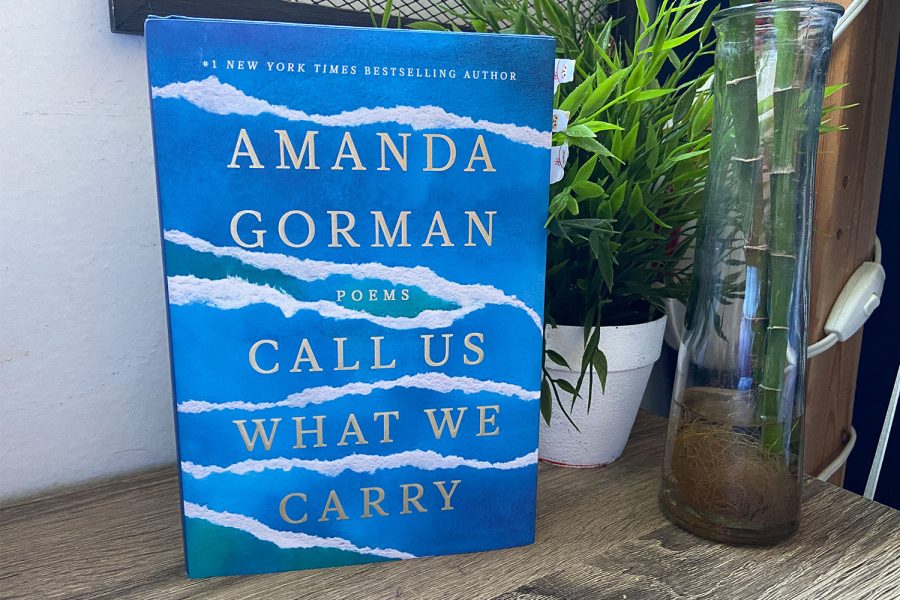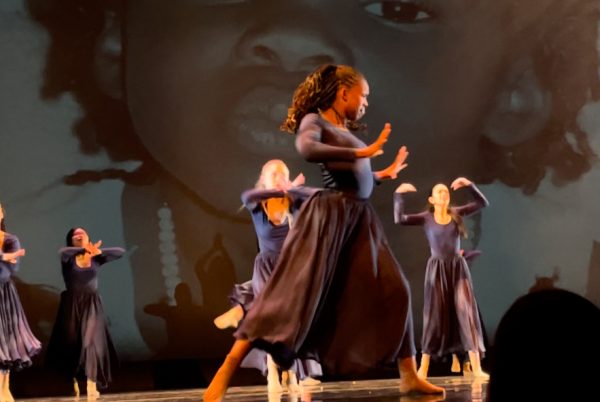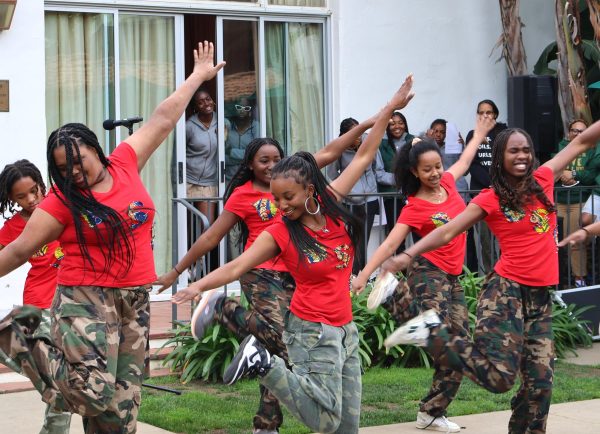Review: ‘Call Us What We Carry’ is a ‘message in a bottle’
Photo credit: Maia Alvarez
Amanda Gorman’s newest poetry book, “Call Us What We Carry,” sits at my favorite place to read, on my desk in my bedroom. Gorman’s collection of poems sailed readers through the storms and sunlight of this past year to reflect upon inner emotions and refract their attention to forgotten narratives.
February 13, 2022
Wordsmith. Changemaker. Amanda Gorman.
Gorman is the youngest inaugural poet in U.S. history and the lighthouse in her new book, “Call Us What We Carry,” letting readers set sail on a journey of reflection, hope and truth. Gorman’s odyssey to fame included her performance at Joe Biden’s presidential inauguration and at Super Bowl LV. Yet in this book, Gorman becomes the cartographer of not just the tale of 2021, but of repressed and diverse stories that have been buried in the sand.
From the moment I heard the news about Gorman’s next book, I knew I wanted to read it. Her recitation of “The Hill We Climb” at President Biden’s inauguration had the whole world, including me, turning their heads to see how someone so young could spin gold from simple words and paper. However, voyaging back into last year’s hardships with a compass of compassion wasn’t what I expected.
Before the reader is able to dive deep into the book’s pages, Gorman expresses the book’s purpose in her first poem, “Ship’s Manifest.” Within the poem, Gorman says how her writing is not only “a wake” but “awake,” emphasizing the book’s effort of preserving humanity’s light during the darkest of times.
Upon opening the cover, readers sink into wonderment at Gorman’s writing style. In many of the poems, Gorman focuses on a specific word, stating its definition before deconstructing and remolding that same definition to give the word new meaning. In “Another Nautical,” Gorman doesn’t simply define “ship” as the vessel but focuses on many versions of the word: the suffix, the verb and the noun. This change in perspective illustrates how adding “-ship” to words helps them gain momentum, such as relationship, leadership and hardship. By using “ship,” Gorman also proves how language is a restoration of one’s thoughts.
Additionally, similar to the connection made in “Survey,” where grief acts as both a mirror and a window, a number of poems in the book mirror synonyms and antonyms or find duality within a word. In other words, Gorman not only has the reader reflecting on themselves and the world, but the words in the poems reflect upon each other, creating a rhythm that wades readers into a melodic experience.
In the poem, “Compass,” Gorman writes: “In history’s form, we find our own faces/recognizable but unremembered/familiar yet forgotten.” The lines act as the push and pull of crashing waves, and thus, a melody is born from the pain and grief of loss the poem expresses.
Like an epic journey across the ocean, Gorman’s collection of poems takes readers on a high-seas thematic and visual adventure. Each page becomes a new surprise, a new treasure to be unearthed. These poems have diverse visual appearances that range from black and white pages to poems formatted like a text exchange. Gorman experiments with creativity, questions the truth and steers our eyes and minds to how being a work in progress doesn’t mean being is any less invaluable.
Throughout different sections of the book, Gorman continues to call upon nautical imagery to envision grief, loss, anguish, love and showcases language’s value in keeping us afloat when those very same emotions drown us. Ships, anchors and even whales rise up as metaphors in poems including “Lighthouse,” “RIP A SHIP” and “ESSEX I,” a poem from the perspective of a sailor on a whaling ship, whose tragedy inspired the novel, “Moby Dick.”
Beyond the imagery, Gorman sneaks in many clever references that brought a small smile to my face as I read. Quotes and homages to “Hamilton,” “Ghostbusters,” “Hamlet,” “The Odyssey” and Rihanna were all mixed between the waves of words. I believe these references are small gold piece treasures that Gorman sneaked in to express her own interests within the literature.
Upon this journey of discovery, the pages go dark and I stumbled upon a poem that soon became one of my favorites. “Fury & Faith” gives homage to the Black Lives Matter movement and the fight against police brutality, illustrating the fight for equality will never cease because, as Gorman says, it’s “more than just a protest/it’s a promise.” Poetic devices such as alliteration, assonance and metaphors pen the impatience for a future that, as Gorman writes, is “free, not flawless,” rage that is “fortified by faith” and hope that will push the future into reality.
“Call Us What We Carry” comes full circle with the final poem, “The Hill We Climb,” the very same poem that introduced me to Gorman during President Biden’s inauguration last year. Yes, it is still as powerful now.
With brilliant and brazen language, refreshing imagery and prevailing stories in each poem, each page of Gorman’s book is a new message in a bottle, waiting to be uncorked. “Call Us What We Carry” is the quiet in an eye of a hurricane; it flickers its light and calls us in.
-
Structure
-
Style
-
Fluidity
-
Theme & Impact
-
Engaging
Summary
“Call Us What We Carry” is a collection of poems focused on exploring grief, truth and hope from important moments in 2021. The collection uses imagery, melodic language and creative formatting to make each poem effortlessly timeless.




![Freshman Milan Earl and sophomore Lucy Kaplan sit with their grandparents at Archer’s annual Grandparents and Special Friends Day Friday, March 15. The event took place over three 75-minute sessions. “[I hope my grandparents] gain an understanding about what I do, Kaplan said, because I know they ask a lot of questions and can sort of see what I do in school and what the experience is like to be here.](https://archeroracle.org/wp-content/uploads/2024/03/grandparents-day-option-2-1200x800.jpg)






























































